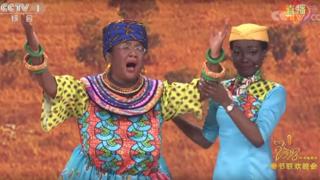 Image copyright
Image copyright
Youtube/CCTV
By some estimates, the show is the most watched entertainment programme on earth
A skit on China’s biggest Lunar New Year TV show has sparked widespread criticism and accusations of racism.
In a comedy routine celebrating Chinese-African ties an Asian actress appears in blackface and with exaggerated buttocks.
Using make-up to lampoon black people – a practice known as blackface – is seen by many as deeply offensive.
The annual state media variety show is hugely popular, and has up to 800 million viewers.
Some observers have pointed out that this sketch would not have been intended as offensive to Africans.
However, this is not the first time Chinese entertainment shows have caused controversy with their portrayals of other ethnicities.
The controversial sketch was part of the four-hour CCTV New Year Gala – also known as the Spring Festival Gala – which aired on Thursday night. By some estimates, the show is the most watched entertainment programme on earth.
The skit begins with a routine by a group of African dancers in “tribal” attire and people dressed up as zebras, giraffes, lions and antelopes. This is followed by a comedy skit where a young black woman asks a Chinese man to pose as her husband when meeting her mother.
While the young woman is played by a black actor, her mother appears to be an Asian actor in blackface make-up, donning a traditional outfit complete with huge fake buttocks.
Image copyright
Youtube/CCTV
The African mother is played by a Chinese lady with extra buttocks added on
She walks on stage carrying a fruit plate on her head and is accompanied by what is thought to be have been a black actor in a monkey suit, carrying a basket on his back.
You might also like:
- The trans teen who helped change Australia
- Chinese New Year food: how to get rich tossing fish
- The man who shares his house with leopards and bears
The skit praises Chinese-African cooperation, showing how much Africans benefit from Chinese investment and how grateful they are to Beijing. At one stage, the character of the African mother exclaims how much she loves China.
China has over the past years stepped up investment into many African countries. The sketch was set around people working on the Nairobi-Mombasa railway project.
China’s soft-power a work in progress
by John Sudworth, BBC News, Beijing
China’s TV gala has become as much a part of the spring festival tradition as dumplings and lanterns. The gaudy sets, highly choreographed dance troupes and sentimental ballads serve as the background noise to hundreds of millions of private family reunions and provide the mass media glue that binds them all into a genuine national moment.
In recent years though there have been grumblings that the gala is taking on a more political tone and this year was no exception – with the whole event a kind of pageant to China’s rising power and national rejuvenation.
The Africa skit was clearly meant to be part of this same vision and is, if nothing else, proof that art is rarely improved by a large dollop of propaganda. But what’s particularly striking about the whole toe-curling spectacle is that it is also strangely at odds with China’s own message.
Chinese investment in Africa is one of the defining economic stories of our time and it has been accompanied by a massive publicity drive.
Bristling at any suggestion that it is involved in neo-colonialism, China insists that it comes not to exploit, but in partnership with and for the mutual benefit of its African partners.
The sight then, of a Chinese actress in blackface, leading an African man dressed as a monkey around a stage as a way of celebrating a vital trading relationship on prime-time national TV, seems particularly ill-judged.
Simply naive and clumsy? Or a sign of something deeper? Either way it suggests China’s soft-power project is still a work in progress.
Europe’s racist history
The notion of blackface being racist is linked to the history of minstrel shows in the US and Europe in the 19th and 20th centuries where white actors would paint their skin black for condescending portrayals of black people.
In China, the vast majority of people have no experience of interacting with black people and are less aware of Europe’s and the US’ history of slavery and racism.
Image copyright
Youtube/CCTV
Celebrating Chinese-African ties?
Nonetheless, Chinese users on the country’s biggest social media website Weibo have condemned the programme.
Comments included “it’s full of racism,” that “it makes me feel like I’m living in the last century,” and that “we are going to lose face internationally”.
Putting it into a larger context beyond the specific history of blackface, one user asks “if an American white person painted yellow, says I love the USA and recites some Trump quotes while pulling his eyes, how would you feel?”
Some Chinese articles criticising the annual gala on the eve of Lunar New Year, China’s biggest holiday, have been blocked overnight, as have some critical comments on Chinese social media sites.
In 2016, a TV advertisement for a laundry detergent had caused widespread outrage for being racist.
The ad featured a black man with paint stains on his face who gets put into a washing machine by a young Chinese woman to later re-emerge as a fair-skinned Chinese man.
Anger over ‘racist blackface’ in China show

